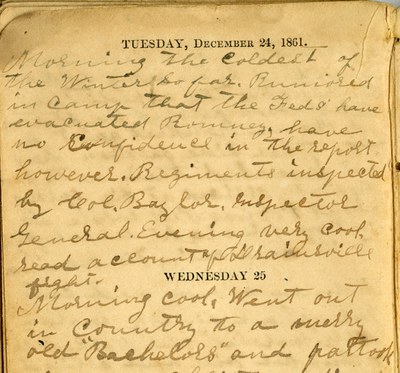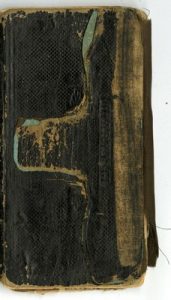
Purchase Tickets
A Tale of Two Diaries


Civil War soldier Harvey Harry Boyd fought for the North and for the South in the Civil War, and we are thankful to have diaries telling his unusual story.
Boyd was born in Monroe County in what became West Virginia in 1840. In May 1861, he enlisted in the Monroe Guards of the 27th Virginia Regiment. He was promoted to corporal in October 1861. Boyd served with Stonewall Jackson and saw combat at the First Battle of Bull Run.
Boyd’s diary contains entries from May 1861 until May 1862 when he was a member of the Monroe Guards of the 27th Virginia Regiment. In his diary, he describes destroying railroads, taking prisoners and being reviewed by Jackson on several occasions. He also tells of the cold and snowy conditions they endured in December and January, and a significant decrease in the regiment’s morale in April and May over leadership. Boyd gives a lengthy account of his regiment at the Bull Run River dated July 27, 1861.
He was promoted to first corporal in April 1862, captured two months later and sent to prison at Fort Delaware, Delaware. He was exchanged in August of the same year. After returning to the Confederate Army, he was wounded in May 1863 and listed as missing. What became of Boyd after that remains a mystery. There is some speculation he may have returned home.
Harvey Boyd next surfaces in January 1865, living in Columbus, Indiana, where he worked for a school and was befriended by a family named Clark. On Jan. 8, 1865, he changed his name to Lewis H. Kimball (Kimble on the oath) and enlisted in Company H of the 11th Indiana Regiment in February 1865. He joined the regiment at Fort McHenry in Baltimore and remained with them until his discharge in July of the same year. In his writing, he complains of overcrowded conditions in the camp and talks about their movement east.
After his discharge, he resumed using the name Harvey Boyd and in August 1865, married Minerva Clark of Columbus. They had four children. Boyd farmed for most of his life, but was working as a janitor for a Columbus school at the time of his death. Boyd, as Kimball, begins his 1865 diary in Columbus, Bartholomew County, talking about a frostbitten foot, teaching school and his friendship with the Clark family.
His post-war diary topics include guarding prisoners, returning home and being discharged at Camp Carrington. Boyd also writes about his joy in learning that the South had surrendered and his mourning of President Lincoln’s assassination. His marriage to Minerva and his return to daily life in Columbus take his focus, and he writes more at length about his feelings toward Minerva and the Clark family. These are not daily entries but are dated periodically from January to July, 1865.
The collection, a gift of Peggy Howe, which has been scanned and is available at images.indianahistory.org, also includes Kimball’s oath of allegiance to the North. Look at Harvey H. Boyd’s diary here and Lewis H. Kimball’s diary here.








